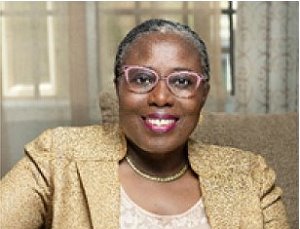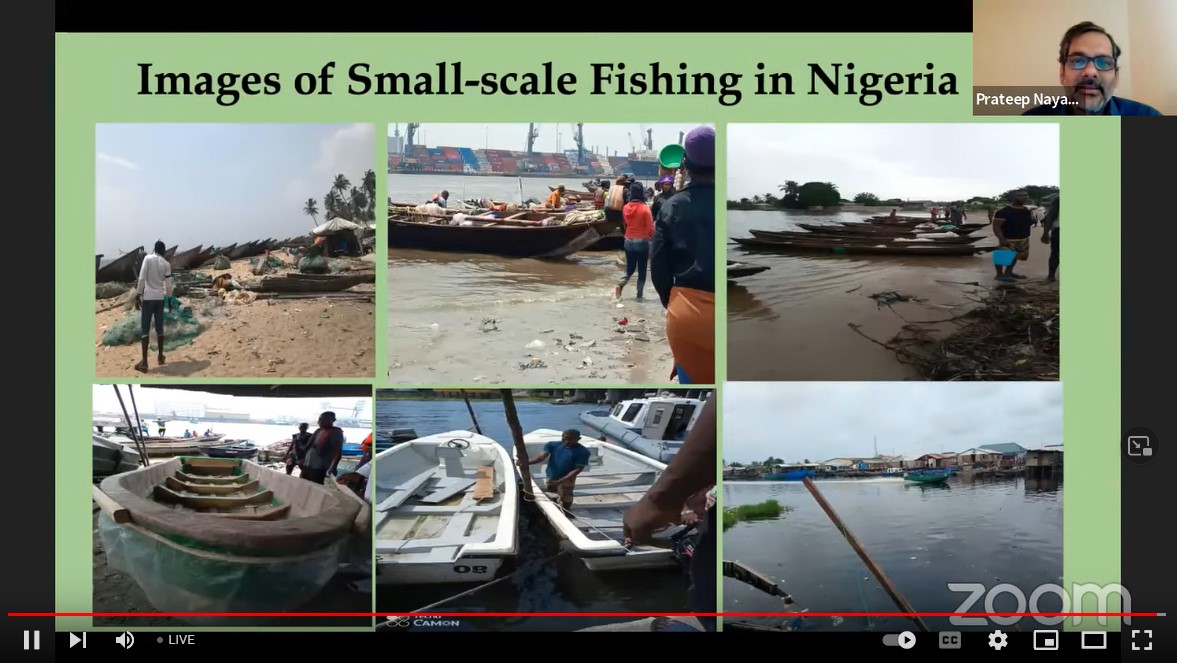This talk by Foluke Omotayo Areola provided an overview of the major challenges to the sustainability of small-scale fisheries and their governance in Nigeria. It addressed teh gaps in the administration of the legal instruments in the sector and discussed obstacles in the socio-economic development of such artisanal fisheries within the legal structures of Nigeria at federal, State and local levels. The tension between different levels of statutory law and customary law can be considerable.

While Nigeria adheres to a large body of international treaties and arrangements many are yet to be domiciled in order to facilitate the transition from vulnerability to viability (V2V). This was the March webinar of the V2V research platform on small-scale fisheries to which Mundus maris is a partner.
Foluke Omotayo Areola is the President-Elect of the African Chapter of the World Aquaculture Society. She is the first Federal Director of Fisheries Quarantine in Nigeria and the first female Acting Federal Director of Fisheries and Aquaculture. She is also a distinguished fellow of the Fisheries Society of Nigeria (FISON), and its first female National President. In her career stretching for decades she had the opportunity to appreciate the difficulties of keeping the functionality of domestic law up to date.
Nigerian small-scale fisheries (SSF) are inland and coastal, multi-species, multi-gear and multi-craft activities providing an estimated 80 to 90 percent of domestic fishfood production according to a 2015 study of the Federal Department of Fisheries. They contribute thus significantly to food security, income and livelihoods by providing a large number of jobs for men and women along the multiple value chains. The size and diversity of the country, the wide distribution of landing and marketing places and staff shortages of federal and State services, however, make it hard to pin down reliable numbers.

In pre-colonial times customary law, exercised through fish festivals, rituals and administered by community elders and priests, regulated fishing effort and access to resources. During colonial times a formal administration over resources was established which gave regional autonomy to legislate the sector. In the post-colonial period legislative acts can be promulgated by federal and State institutions on the basis of the Constitution. The basics are laid down in the 1999 Constitution updated in 2010.
The Federal Government has sole authority over the maritime space, but inland water resources and SSF are also subject to State authority. The Constitution is silent about local governance arrangements. Customary law thus continues de facto to play an important role locally, especially in situations, where statutory law is not represented through sufficient well trained officers and/or where fines for breaking the law are very low compared to the gains from transgressions.
Among the remedial action for improving sector governance and protection of small-scale fishers from multiple threats, such as industrial overfishing in marine waters, oil pollution and other forms of pollution in inland waters, Foluke recommended updating the legal frameworks and capacity building to overcome considerable awareness deficits on the legal framework amongst operators and enforcers. She also advocated substantial and regular funding of sector institutions.
Académie de la pêche artisanale
- Make Fishing Fair in the EU, 25 March 2025
- Relations entre l’Homme et la biodiversité au travers de différentes échelles
- Célébration de la Journée mondiale de la pêche au Nigeria, 21 novembre 2024
- Mundus maris a participé à la Journée mondiale de la pêche 2024 organisée par la Canoe and Fishing Gear Association of Ghana (CaFGOAG).
- Contribution de Mundus maris à la consultation publique de l’UNOC3
- Sommet sur la pêche artisanale à Rome, 5-7 juillet 2024
- Symposium régional sur la pêche artisanale européenne, Larnaca, Chypre, 1-3 juillet 2024
- Réunion d’urgence sur la pêche dans la Baltique, Bruxelles, 26 juin 2024
- Ambivalent role of Market and Technology in the Transitions from Vulnerability to Viability: Nexus in Senegal SSF
- Shell fisheries as stewardship for mangroves
- Edition Africaine du 4ème Congrès Mondial de la Pêche Artisanale (4WSFC) à Cape Town, du 21 au 23 novembre 2022
- Journée mondiale de la pêche, 21 novembre 2023
- Séminaire en ligne : Défis et opportunités de la pêche au Nigeria
- Présentation de l’application FishBase au Symposium de Tervuren
- Conférence MARE sur la Peur bleue – Mundus maris réfléchit
- The Transition From Vulnerability to Viability Through Illuminating Hidden Harvests, 26 May 2023
- Les sessions de l’EGU se concentrent sur la géoéthique et l’apprentissage collaboratif
- Solidarité avec les artisans pêcheurs du Sénégal et de la Mauritanie
- The legal instruments for the development of sustainable small-scale fisheries governance in Nigeria, 31 March 2023
- Tools for Gender Analysis: Understanding Vulnerability and Empowerment, 17 February 2023
- Community resilience: A framework for non-traditional field research, 27 January 2023
- Sustainability at scale – V2V November webinar
- 4WSFC Europe à Malte, 12-14 septembre 2022
- Mundus maris prend part au Sommet de Rome consacré à la pêche artisanale
- Women fish traders in Yoff and Hann, Senegal, victims or shapers of their destiny?
- L’Académie continue son travail à Yoff
- Illuminating the Hidden Harvest – a snapshot
- Virtual launch event FAO: International Year of Artisanal Fisheries and Aquaculture
- The Small-Scale Fisheries Academy as a source of operational support to PA Guidelines
- World Fisheries Congress, Adelaide, 20-24 September
- Mundus maris supports the fight of Paolo, the fisher, in Tuscany, Italy
- Rattrapage – Academy PAD à Yoff, 27 févr. 2021
- Renforcement des capacités des acteurs de la pêche artisanale
- Essai des méthodes de formation lors de la phase pilote de l’Académie PAD au Sénégal
- Une première – Inauguration d’une Académie de la pêche artisanale au Sénégal
